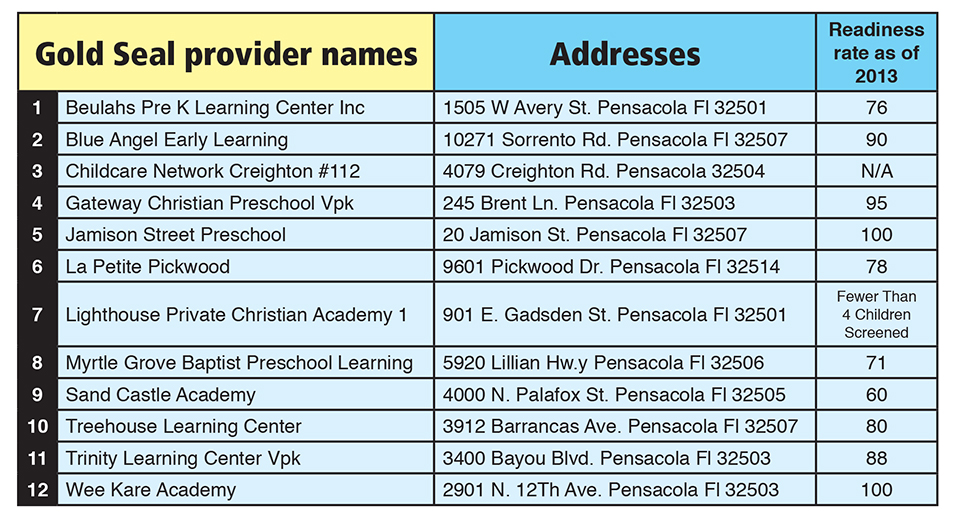What does a Gold Seal VPK program look like?
- June 7, 2016
- / Reggie Dogan
- / education

Sandy Lyons reads to VPK students at Trinity Learning Center. Trinity was among local childcare centers that participated in research
that Florida State University is doing on how to help young children become better readers. Photo credit: Michael Spooneybarger.
Childcare experts will tell you that attending a high-quality program prepares children for kindergarten.
Through research they can show that high-quality pre-K can help close the achievement gap between children.
It’s pretty clear that high-quality childcare can have a positive effect on children’s development and school readiness by providing valuable educational and social experiences.
But it can get fuzzy when people try to identify and define what high-quality childcare actually means.
Florida at least has made an attempt to showcase quality daycares through something called the Gold Seal Quality Care Program.
That’s a designation the Florida Legislature has established to acknowledge childcare facilities and family daycare homes that are accredited by nationally recognized agencies in the field among other criteria.
For some, the Gold Seal is sacrosanct. For others, it’s much ado about nothing.
There are 200 licensed childcare centers in Escambia County. Of those, 85 are authorized as providers of the state’s voluntary prekindergarten program; 165 of the centers participate in the School Readiness Program, which offers working parents a subsidy to pay for the cost of childcare as long as they work at least 20 hours a week and earn an income of 150 percent of the federal poverty level.
Only 15 providers in the county are Gold Seal Quality Care programs, and 12 of them offer VPK.
I visited each of the 12 VPK Gold Seal programs in Escambia. Two of them — Wee Kare Academy and Jamison Street Preschool — have a kindergarten readiness rate of 100 percent.
Sand Castle Academy, with a readiness school of 60, was the only one that scored below the 70 percent rate and therefore is considered a Low-Performing Provider.
Among the goals of the Studer Community Institute is to improve the community’s quality of life, and providing quality education is an important part of it.
One of the key 16 metrics included in the Pensacola Metro Dashboard is kindergarten readiness. The first five years have a tremendous impact on a child’s early education.
From as far Southwest as Blue Angel Early Learning on Sorrento Road to the north at La Petite Pickwood off Nine Mile Road, I found directors and daycare workers dedicated and committed to helping little children get ready for kindergarten, one day, one child, one instructor at a time.
Displayed near the front door, on a wall or in both places was the Gold Seal plaque from the state with the governor’s signature. It says loud and clear to parents, to visitors, to anyone who cares that this facility has taken the steps to meet state standards as a high-quality program.
And what does that really mean?
Florida's Gold Seal Quality Care program was created in 1996 as a way to improve program quality in childcare and serve as a symbol of quality for parents when choosing a childcare provider for their children.
Childcare programs can receive a Gold Seal certificate if they submit evidence that they are accredited under one of the approved accrediting associations to the Florida Department of Children and Families, the state agency responsible for childcare licensing and regulation.
The state invests about $33 million in additional payments for Gold Seal programs for children receiving childcare subsidies through the Florida Office of Early Learning. Gold Seal programs.
Providers who earn the Gold Seal can get an increase of up to 20 percent in funding from the Early Learning Coalition through the School Readiness Program. Childcare centers must seek the designation on their own and pay for the costs associated with obtaining it.
Child-care centers that become accredited by one of more than a dozen agencies are eligible for the gold seal. But each accrediting body is different so it's hard to tell exactly what the gold seal means. For example, some accrediting groups let teenagers as young as 15 and 16 years old work in classrooms. Others require staff be at least 18. Some demand that lead teachers be 21 and have certain education credentials.
A plan that would have required preschool teachers to be at least 18 years old and have at least a high school diploma failed to become law last year.
Of the 12 Gold Seal VPK providers in Escambia County, nearly all of them follow state standards of 1:11 teacher-to-child ration.
Costs weekly range from $103 to $260 for for 3-year-olds, and from $112 to 260 for infants.
The providers mostly are accredited by APPLE, the standard in early childhood education. They primarily use Creative curriculum and teachers must be 18 years old and meet the state standards of at least 40 hours of department-approved training and pass a competency exam.
In the end, does having a Gold Seal equate to having a high-quality program?
A Florida State University study examined the differences between programs accredited by one of 11 accrediting associations approved under Gold Seal and observed quality as measured by the Environment Rating Scales.
Findings showed that Gold Seal programs scored higher on measures of quality than non-Gold Seal programs and differences were statistically significant; although the differences are relatively small.
Four of the 11 accrediting associations approved under Florida's Gold Seal policy scored higher on the ERS. In spite of the highlights, the distribution of scores showed that only 19.4 percent of Gold Seal programs scored in the good to excellent range compared to 14.9 percent of non-Gold Seal programs. Further, 11.4 percent of Gold Seal programs and 21.3 percent of non-Gold Seal programs scored in the range of poor and inadequate care.
These results suggested that while Florida's Gold Seal programs score slightly higher than non-Gold Seal programs on the ERS, overall program quality in the majority of programs was mediocre to poor in the state.
Of the 12 VPK Gold Seal programs in Escambia County, 11 of 12 scored a readiness rate ranging from 71 to 100. Each of them had waiting lists for enrollment and all have been helping kids get ready for kindergarten for at least 10 years. One program — Gateway Christian School — has been serving children for nearly four decades.
Director Barbara Deem says the school’s history, service and reputation are so strong that they see little value in accreditation or a gold seal.
“We have a reputation for quality daycare,” Deem says. “We’ll eventually let accreditation go and there is no real benefit to a Gold Seal.”

 CivicCon launches with a look at good growth in cities
CivicCon launches with a look at good growth in cities
 Building stronger brains one baby, one parent at a time
Building stronger brains one baby, one parent at a time
 SCI debuts commercial on Early Learning City
SCI debuts commercial on Early Learning City
 Entrecon: World class speakers and an opportunity to sharpen skills
Entrecon: World class speakers and an opportunity to sharpen skills
 PYP Quality of Life survey 2017
PYP Quality of Life survey 2017
 EntreCon Pensacola 2016: A look back
EntreCon Pensacola 2016: A look back
 Leadership tip: getting better employee takeaways
Leadership tip: getting better employee takeaways
 Leadership tip: be interested instead of interesting
Leadership tip: be interested instead of interesting
 Leadership tip: delivering difficult messages
Leadership tip: delivering difficult messages
 Brain Bags boost Arc, Early Childhood Court programs
Brain Bags boost Arc, Early Childhood Court programs